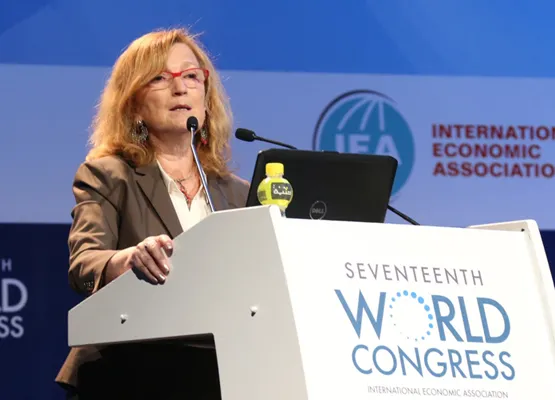
Recognized for introducing new perspectives on the study of inequality, poverty, and public policy in Latin America, Nora Lustig has devoted the last decade of her research to studying how governments collect and redistribute money. With the support of the Bill and Melinda Gates Foundation, Lustig and her team are now able to take their work to the next level.
“Funding allows researchers to accomplish goals that would be impossible otherwise,” says Lustig, the Samuel Z. Stone Professor of Latin American Economics.
The Gates Foundation funds the Commitment to Equity (CEQ) project that has assessed the economic environment of twelve Latin American countries and six in other regions. The grant is currently supporting the completion and dissemination of a handbook that will provide a detailed roadmap for governments to build a more equitable society.
“We (my doctoral students, Professor Jim Alm and I) are very fortunate to have been awarded a grant from the Bill and Melinda Gates Foundation to produce a fully revised handbook,” says Lustig. “Without the grant, it would have been impossible to develop this full-fledged version of the CEQ Handbook.” The online handbook will include an innovative methodological section, the necessary adaptations to apply those methods in low-income countries, recommendations for fiscal incidence analysis by rural-urban, race and ethnicity, and gender, and all the software programs to facilitate the replication of that analysis.
But Lustig says the Gates Foundation grant also enhances her teaching. She uses the findings from the Commitment to Equity project in all of her courses and feels that the evidence-based findings have allowed her students to experience the usefulness of economics under a new light. Commenting on her Economics of Poverty class, for example, one of her undergraduate students wrote, “I learned a lot of things about countries in a macroscopic level that never would have crossed my mind. The class also gave me great confidence that there are many things one can do related to Economics that are both interesting and exciting.”
“Through the Gates grant, I can support my graduate students and expand the reach of the CEQ project to new limits. I can travel and learn about new places such as Ghana and Tanzania, the two countries the Gates grant is funding,” says Lustig. “I can involve other scholars and benefit from their expertise. I can potentially have much more impact as the grant makes the project better known.”
Lustig is grateful for the support of the Gates Foundation and looks forward to the completion of the CEQ Handbook and the studies for Ghana and Tanzania. She also looks forward to working on her project The Social State in XXI Century, Assessing the Impact of Taxes and Transfer in the Developing World. Her sabbatical leave and the Gates grant will allow her to devote her time entirely to work on this research project.

